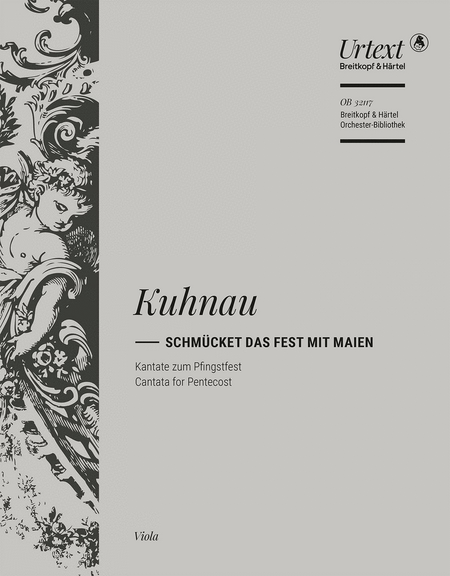Schmucket das Fest mit Maien
Cantata for Pentecost - Urtext
-
Ships in 3 to 4 weeks
Details
Description
SKU: BR.OB-32117-19
Cantata for Pentecost - Urtext. Composed by Johann Kuhnau. Edited by David Erler. Choir; stapled. Orchester-Bibliothek (Orchestral Library). Cantata; Baroque. Sheet Music. 4 pages. Duration 25'. Breitkopf and Haertel #OB 32117-19. Published by Breitkopf and Haertel (BR.OB-32117-19).ISBN 9790004350850. 10 x 12.5 inches.
The cantata Schmucket das Fest mit Maien has survived without any information about the time of its composition, its purpose, or its scoring. The librettist is also unknown, although there is a comparatively similar text in the work of the Silesian poet Hans Assmann Freiherr von Abschatz (1646-1699), printed in Leipzig in 1704. Since the copy of the score that serves as the source for this edition was probably written after 1708, and the work is closely related to the cantata Daran erkennen wir (PB 32090), it could have been written during Kuhnau's first years as Thomaskantor from 1701 on.The text set to music provides information about the purpose of the cantata. In the course of the work, the image of the bridegroom and his bride from the Song of Songs is reinterpreted as the sending of the Holy Spirit upon the congregation of Christians. In the first part, passages from the Song of Songs predominate while the second part quotes their symbolic interpretations or treats them in free poetry. In the concluding chorale, a stanza from Philipp Nicolai's "Wie schon leuchtet der Morgenstern" ("How beautifully the morning star shines"), the outpouring and the flames are also mentioned, so the purpose to the feast of Pentecost is clear.Another special feature of the cantata is the varied and colorful instrumentation with the scoring of two flutes, two oboes and bassoon in individual movements, in addition to the usual, sometimes divided strings.

 Share
Share